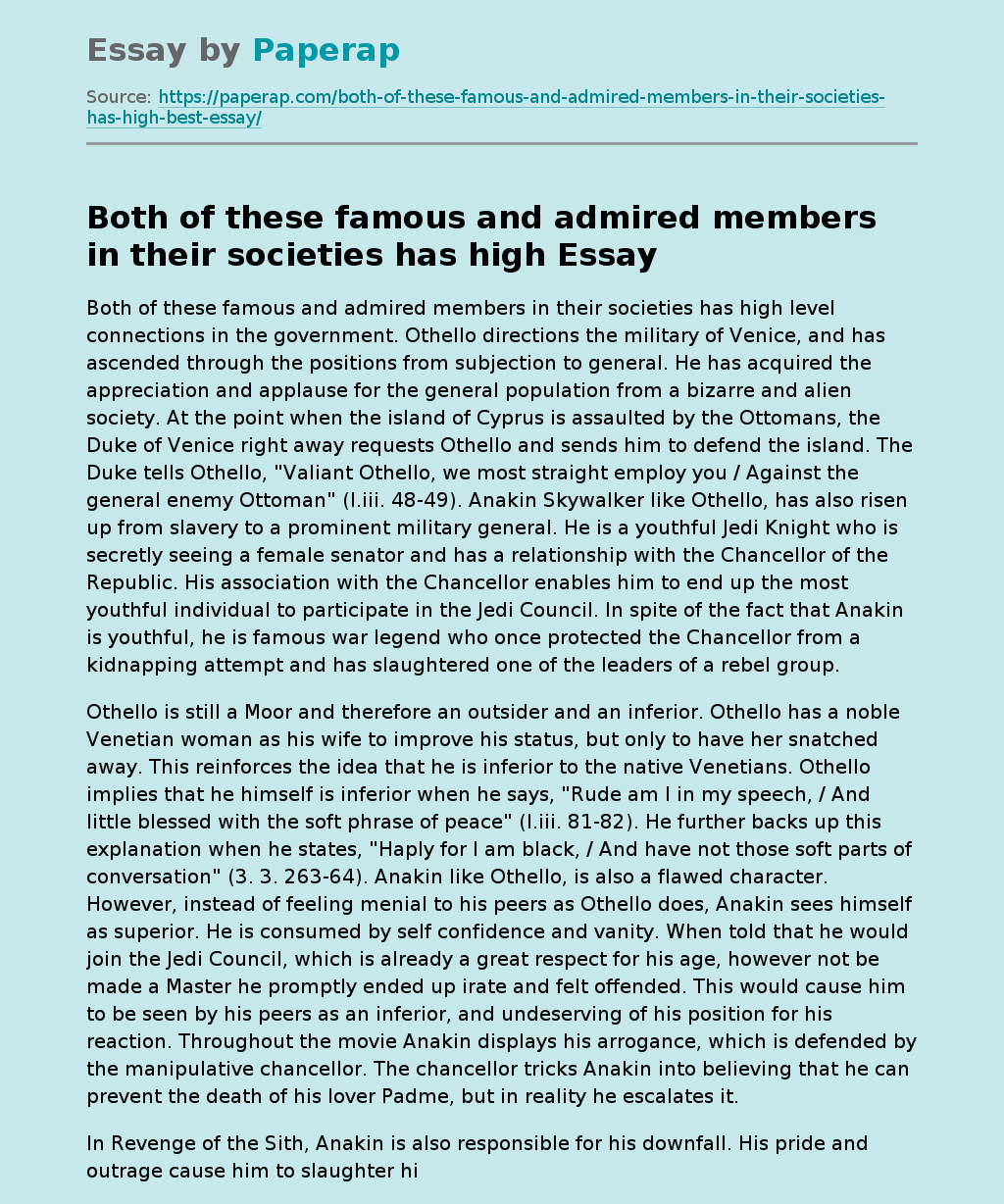Othello and Anakin Skywalker
The following example essay on “Othello and Anakin Skywalker” compares Shakespeare’s The Tragedy of Othello, The Moor of Venice and Anakin Skywalker, also known as Darth Vader, the central character of the first six episodes of the Star Wars saga.
Both of these famous and admired members in their societies has high level connections in the government. Othello directions the military of Venice, and has ascended through the positions from subjection to general. He has acquired the appreciation and applause for the general population from a bizarre and alien society.
At the point when the island of Cyprus is assaulted by the Ottomans, the Duke of Venice right away requests Othello and sends him to defend the island. The Duke tells Othello, “Valiant Othello, we most straight employ you / Against the general enemy Ottoman” (I.iii. 48-49).
Anakin Skywalker like Othello, has also risen up from slavery to a prominent military general. He is a youthful Jedi Knight who is secretly seeing a female senator and has a relationship with the Chancellor of the Republic.
His association with the Chancellor enables him to end up the most youthful individual to participate in the Jedi Council. In spite of the fact that Anakin is youthful, he is famous war legend who once protected the Chancellor from a kidnapping attempt and has slaughtered one of the leaders of a rebel group.
Othello is still a Moor and therefore an outsider and an inferior. Othello has a noble Venetian woman as his wife to improve his status, but only to have her snatched away.
This reinforces the idea that he is inferior to the native Venetians. Othello implies that he himself is inferior when he says, “Rude am I in my speech, / And little blessed with the soft phrase of peace” (I.iii. 81-82). He further backs up this explanation when he states, “Haply for I am black, / And have not those soft parts of conversation” (3. 3. 263-64). Anakin like Othello, is also a flawed character.
However, instead of feeling menial to his peers as Othello does, Anakin sees himself as superior. He is consumed by self confidence and vanity. When told that he would join the Jedi Council, which is already a great respect for his age, however not be made a Master he promptly ended up irate and felt offended. This would cause him to be seen by his peers as an inferior, and undeserving of his position for his reaction. Throughout the movie Anakin displays his arrogance, which is defended by the manipulative chancellor. The chancellor tricks Anakin into believing that he can prevent the death of his lover Padme, but in reality he escalates it.
In Revenge of the Sith, Anakin is also responsible for his downfall. His pride and outrage cause him to slaughter his superior and betray everything he has sworn to defend. This is fulfilled to protect the chancellor because he believes that the chancellor is the only person who can save Padme from the prophetic visions he has been having of her death. In the wake of submitting this homicide, he can redeem himself by securing the chancellor, rather, he chooses to give in totally to him and help him decimate the Jedi.Later, when confronted by Padme and Obi-Wan, his anger and feelings of betrayal cause him to kill Padme, the person he sold his soul to save.
In Othello, the punishment does fit the crime. Othello kills his wife for a wrongdoing she has not committed with no substantial evidence either. He condemns her without ever catching her actually betraying him and without having any real evidence. He even takes some pride in his crime when he says, “She’s like a liar gone to burning hell! / ‘Twas I that killed her” (V. ii. 129-30). Immediately after Othello’s death Cassio says, “This did I fear, but thought he had no weapon; /For he was great of heart” (V. ii. 360-61). Othello’s suicide balances his murder of his wife.
These tragic hero’s are not fully deserving for their evil doings but still deserve some punishment for acting as pawns to others. In Revenge of the Sith, Anakin deserves punishment for his crime. He murdered his superior, participated in the massacre of his peers, killed the woman he loves, and allowed a brutal dictator to take power yet his only punishment is to live with his crimes. Aside from killing Padme, he does not see anything wrong with what he has done. He describes his actions by saying, I have brought peace, justice, freedom, and security to my new Empire.
Lastly, Anakin’s fate does not balance the scales of justice. No form of redemption is made for either of the characters. Although Othello does see that he was wrong and speaks about how he has been wronged. Anakin lacks any remorse, and at the end he feels nothing but anger. Although he is regretful for killing Padme, he still assists the evil Emperor.
Othello and Anakin Skywalker show some elements of a tragic hero, which is caused by many similarities they face. A tragic hero’s fall brought about by his actions. Othello’s downfall is due to his actions. He was too willing to believe Iago’s accusations with his insecurities. In spite of having no genuine verification of any strange “behavior” other than the words of Iago, he becomes aggressive to Desdemona. He even strikes her in public and later calls her “that cunning whore of Venice that married with Othello” (IV. ii. 89-90).
Thus, Othello’s actions directly lead to his downfall. The characters do not suffer more than they deserve, and neither of them is truly redeemed. Frequently, with tragic heroes, they end up with punishments they do not deserve. Which is a cruel reward for the causes they have fixed. Lastly, Inevitably, the journey of a tragic hero cultivates a societal effect which influences the circumstances and conditions of others.
Othello and Anakin Skywalker. (2019, Dec 17). Retrieved from https://paperap.com/both-of-these-famous-and-admired-members-in-their-societies-has-high-best-essay/

